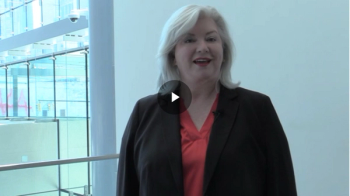
Kerrie Brady, CEO of OcuTerra Therapeutics, shares an update on their eye drop-based integrin inhibitor, which is intended to be a novel therapy for diabetic retinopathy.

Kerrie Brady, CEO of OcuTerra Therapeutics, shares an update on their eye drop-based integrin inhibitor, which is intended to be a novel therapy for diabetic retinopathy.
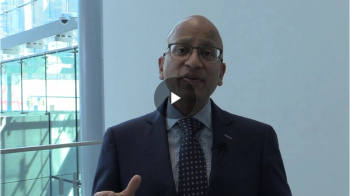
At ASRS 2022, Sunir Garg, MD, FACS, discussed his talk entitled, “Impact of Delay in Repair of Rhegmatogenous Retinal Detachment: Real-World Outcomes from the IRIS Registry.”
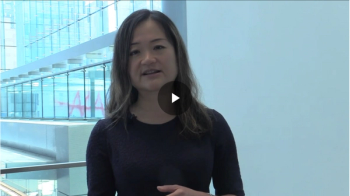
At ASRS 2022, Sally Ong, MD, presented a talk entitled, “Vitrectomy vs Vitrectomy With Scleral Buckling in the Treatment of Giant Retinal Tear Related Retinal Detachments: International Multicenter Study.” Here she shares the biggest takeaways.
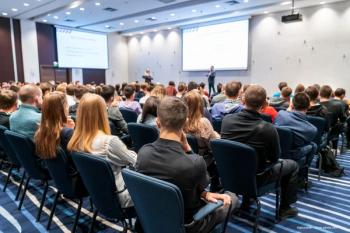
The American Society of Retina Specialists held its 40th Annual Meeting in New York, New York, from July 13-16, 2022. While data was presented for all topics in retina, new revelations in age-related macular degeneration, diabetic retinopathy, and diabetic macular edema dominated the conversation.
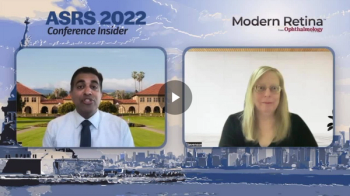
Rahul Khurana, MD, discusses his 2022 ASRS talk, “Phase 2 Study of THR-149, a Plasma Kallikrein Inhibitor in Patients With DME Who Respond Suboptimally to Anti-VEGF Treatment (Month 6 Results of Part A of the KALAHARI Study),” which he presented in New York City, New York.
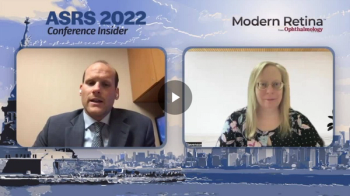
At ASRS in New York, Matthew Starr, MD, presented, “Factors Associated With Fluctuations in Central Subfield Thickness in Patients With Diabetic Macular Edema Using 2 Clinical Trial Databases.”
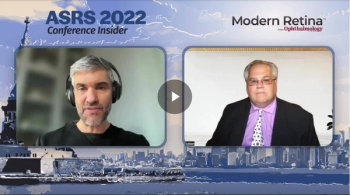
At ASRS in New York City, Charles Wykoff, MD, presented a talk entitled, “Suprachoroidal Delivery of RGX-314 Gene Therapy for Diabetic Retinopathy: Phase II ALTITUDE Study.” The trial demonstrated large improvements for patients with diabetic macular edema (DME) and non-proliferative diabetic retinopathy (NPDR), with notable improvements according to the Diabetic Retinopathy Severity Scale (DRSS).
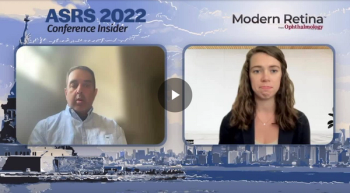
At ASRS 2022 in New York City, New York, Rishi Singh, MD, is presenting, “12-Month Results of EYP-1901 Vorolanib in a Bioerodible Durasert Insert for nAMD: The DAVIO Trial.” The Phase 1 trial showed a reduction in treatment burden over 12 months as well as a favorable safety profile.
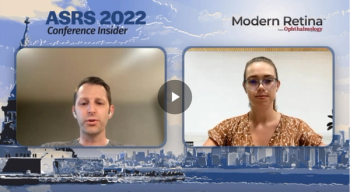
Christopher Henry, MD, presented a talk entitled, “Efficacy of Suprachoroidal Triamcinolone Acetonide Injectable Suspension in the Treatment of Macular Edema in Patients With Chronic Uveitis,” at ASRS 2022 in New York City, New York.
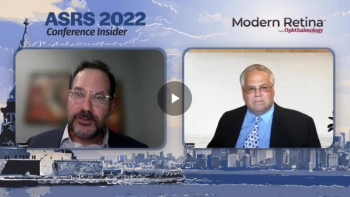
At ASRS in New York City, New York, David Eichenbaum, MD, presented “Efficacy, Durability, and Safety of Faricimab in Diabetic Macular Edema: 2-year Results on the Phase 3 YOSEMITE and RHINE Trials.”
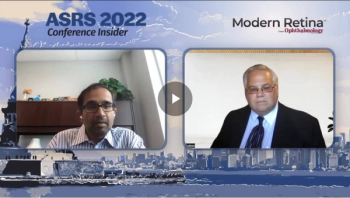
At ASRS 2022, Raj K. Maturi, MD, presented a talk entitled, “UBX1325, A Novel Senolytic Therapy for Treatment- Experienced Patients With Chronic DME or Wet AMD: 24-Week Results of a Phase 1 Study.”
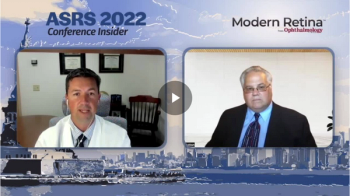
At ASRS in New York City, New York, Justis Ehlers, MD, presented a talk entitled, “Higher Order OCT Feature Assessments of the Impact of Fluid Dynamics on Visual Acuity in Neovascular AMD in a Phase III Clinical Trial: The Importance of Outer Retinal Integrity.” Here he discusses the findings.
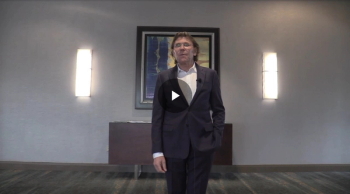
Albert J. Augustin, MD, presented a talk entitled, “First Results of the Miniature Telescope in Dry AMD” in Fort Lauderdale, Florida. The Galilean telescope device offers visual improvements for patients with late-stage AMD.
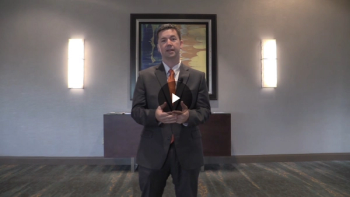
Justis P. Ehlers, MD, dissects the revelations from the data in the Phase 3 Hawk clinical trial regarding the impact of central subfield thickness, volatility and the overall impact on visual acuity.

A poll for retina specialists regarding their attendance at the 2022 American Society of Retina Specialists 40th Annual Scientific Meeting in New York City, New York. This poll is now closed.
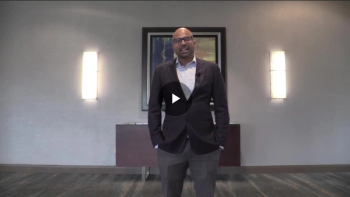
Dilsher Dhoot, MD, discusses the post hoc analysis of the Copernicus and Galileo trials, which investigated if a delay in treatment would affect visual acuity gains or change in anatomy.
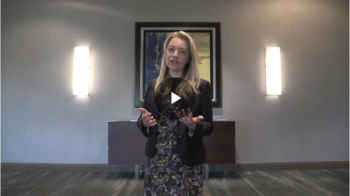
Aleksandra Rachitskaya, MD, discussed the Phase 3 Archway end-of-trial results for the investigation of the Port Delivery System with ranibizumab in neovascular AMD.
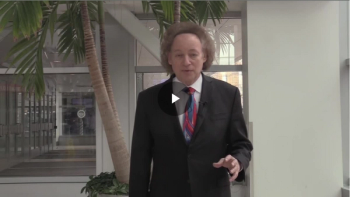
Richard Rosen, MD, shares insights on how imaging can capture hyalocytes and their movement without the use of dyes.
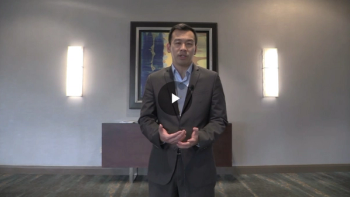
Steven Yeh, MD, provides a brief overview of available therapies for noninfectious uveitis and uveitis macular edema.
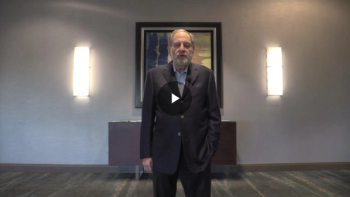
David Boyer, MD, discusses the Phase 3 investigation for OPT-302 combination therapy for wet AMD.
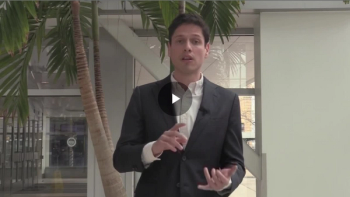
The study assesses retinal blood biomarkers using a new prototype OCT, aiming to measure retinal biomarkers such as blood flow volume, average velocity, and vessel diameter with a new prototype.
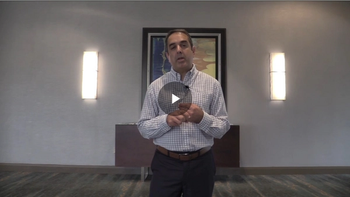
In the study, the faricimab molecule, which is a combined anti-Ang2 and anti-VEGF, performed better than the aflibercept drug in many different ways. Rishi P. Singh, MD, FASRS, summarizes some of these key findings.
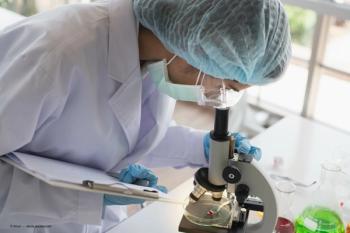
Biogen and Samsung Bioepis announce the launch of ranibizumab-nuna and detail when the ophthalmic biosimilar will be available for retina specialists.
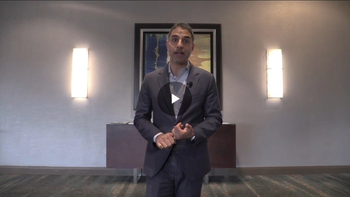
Yasha S. Modi, MD, discusses his best tips and tricks for finding and diagnosing infectious uveitis.
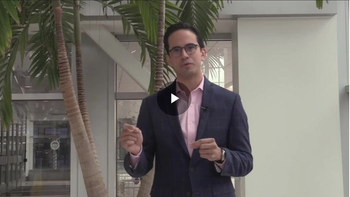
Carlos Quezada Ruiz, MD, senior medical director at Genentech, discusses “Predicting optimal treatment regimen for patients with neovascular age-related macular degeneration using machine learning.”
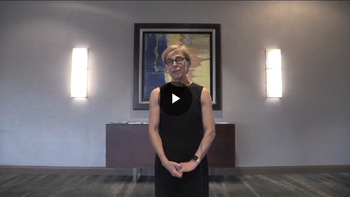
Professor Anat Loewenstein, MD, discusses data regarding the efficacy of faricimab at targeting both the VEGF and Ang2 pathways in patients with neovascular AMD and diabetic macular edema.
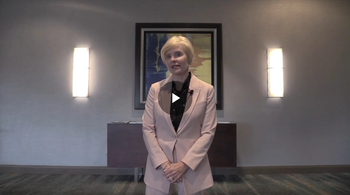
EyePoint Pharmaceuticals hopes to usher in a new paradigm of retinal eye disease treatments with their candidate EYP-1901.
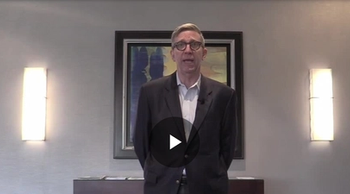
As novel therapies in the pipeline are aiming to decrease the rate of GA expansion—the endpoint Karl Csaky, MD and Fredrick Ferris III, MD, identified in 2007—Dr. Csaky reinforces on the importance of preserving the central retinal tissue.
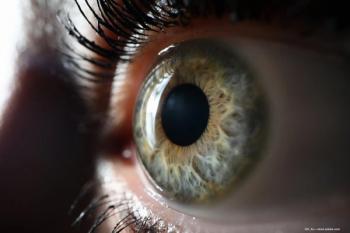
Apellis revealed 18-month data for their investigational C3 therapy pegcetacoplan, unveiling continuous lesion growth reduction in eyes with geographic atrophy with monthly and every-other-month injections.
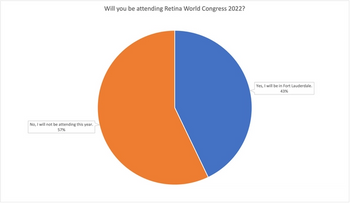
Results from our recent poll regarding Retina World Congress 2022 attendance indicate that while many retina specialists will attend the Congress, the majority will not be in Fort Lauderdale, Florida.